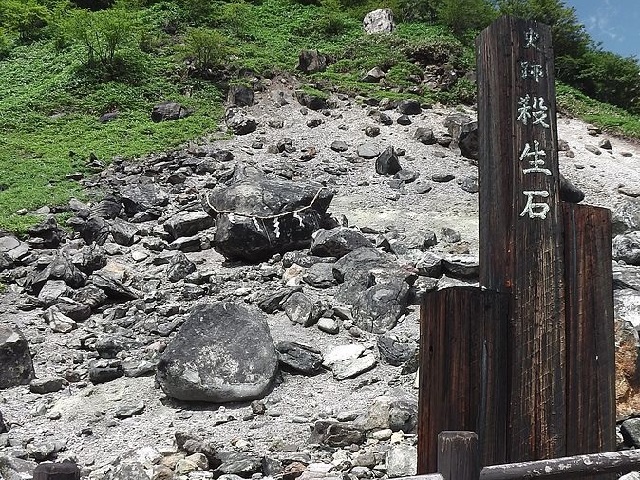
Stone said to imprison evil fox spirit spilt in half earlier this year.
The town of Nasu, Tochigi Prefecture, has some wonderful sights for travelers to see. Majestic mountains. Lush forests. The Killing Stone.
OK, so that last one might not immediately scream “Fun vacation!” so much as “Stay away!” The folklore surrounding the rock, though, which claims it holds the imprisoned spirit of an evil nine-tailed kitsune (fox spirit), makes it an intriguing local landmark, especially for fans of folktales and anime series in which fox spirits feature.
This month, though, the Killing Stone’s name has proven to be truth in advertising, as on the morning of December 7 the bodies of eight wild boars were discovered in Nasu, with the animals dropping dead near the stone.
▼ The Killing Stone. The bodies of the boars (three adults and five piglets) can be seen at the 45-second mark).
The incident comes almost exactly nine months after the Killing Stone suddenly split in two, prompting the performance of a purification ceremony by a local Shinto priest at the site. With the Killing Stone back in the news once again, Japanese Twitter users have reacted with comments such as:
“Well, it is the Killing Stone, after all.”
“I thought it was just superstition and stories, but it can seriously kill…”
“Something has awakened.”
“Is…is this the curse of the kistsune?”
“When the stone split back in March, some people wondered if it was the seal breaking.”
There is, however, a non-supernatural explanation. The Killing Stone is located in Nasu’s Yumoto district. Yumoto translates as “source of hot water,” a reference to the geothermic activity that heats Nasu’s hot springs. However, there’s also a lot of hydrogen sulfide and sulfurous acid gas that seeps out of the ground in the area around the Killing Stone.
A human adult with a healthy constitution isn’t likely to be affected by the amount of exposure they’ll experience stopping by the Killing Stone to snap some pictures, but the gases are poisonous. Satohiko Zensoji, a member of the Ministry of the Environment’s Nikko National Park Nasu Office, believes wild animals are also exposed to a greater concentration of the gasses (compared to humans) because of their proximity to the ground. However, while there have been previous reports of carcasses of tanuki and foxes (as in actual fox animals, not kitsune spirits) found near the killing stone, this is the first time Zensoji can recall boars being felled by the Killing Stone’s environment.
Tests to see if the boars had been infected with swine fever came back negative, lending further plausibility to explanation of poisonous gas being the cause of death. The animals’ carcasses have been removed and incinerated, and with the rough couple of weeks boars have been having in Japan, hopefully it’s the last sad story we’ll have about them for a while.
Source: Shimotsuke Shimbun via Yahoo! Japan News, Twitter
Top image: Wikipedia/ウィキ太郎
● Want to hear about SoraNews24’s latest articles as soon as they’re published? Follow us on Facebook and Twitter!

 Mist descends upon Japan’s “Killing Stone” after ceremony to appease nine-tailed fox spirit
Mist descends upon Japan’s “Killing Stone” after ceremony to appease nine-tailed fox spirit Japan’s “killing stone” splits in two, possibly unleashing evil nine-tailed fox spirit
Japan’s “killing stone” splits in two, possibly unleashing evil nine-tailed fox spirit Lawson adds doughnuts to its convenience store sweets range, but are they good enough to go viral?
Lawson adds doughnuts to its convenience store sweets range, but are they good enough to go viral? 7-Eleven Japan’s most popular product with foreign tourists is…a unique chocolate gummy
7-Eleven Japan’s most popular product with foreign tourists is…a unique chocolate gummy The fish in rural Fukui that rivals Japan’s most auspicious sea bream
The fish in rural Fukui that rivals Japan’s most auspicious sea bream Japan Extreme Budget Travel! A trip from Tokyo to Izumo for just 30,000 yen [Part 1]
Japan Extreme Budget Travel! A trip from Tokyo to Izumo for just 30,000 yen [Part 1] Patlabor AV-98 Ingram anime mecha arrives in Niigata, residents welcome their giant robo-cop
Patlabor AV-98 Ingram anime mecha arrives in Niigata, residents welcome their giant robo-cop How to eat lunch in Tokyo for less than 300 yen
How to eat lunch in Tokyo for less than 300 yen Eevee returns to Japan’s famous Tokyo Banana, bundled with a cute tote bag
Eevee returns to Japan’s famous Tokyo Banana, bundled with a cute tote bag Japanese restaurant chain serves Dragon Ball donuts and Senzu Beans this spring
Japanese restaurant chain serves Dragon Ball donuts and Senzu Beans this spring The results are in! One Piece World Top 100 characters chosen in global poll
The results are in! One Piece World Top 100 characters chosen in global poll We tried Pokémon Sleep at an exclusive overnight pre-release experience
We tried Pokémon Sleep at an exclusive overnight pre-release experience Starbucks Japan releases first-ever Hinamatsuri Girls’ Day Frappuccino
Starbucks Japan releases first-ever Hinamatsuri Girls’ Day Frappuccino Highest Starbucks in Japan set to open this spring in the Tokyo sky
Highest Starbucks in Japan set to open this spring in the Tokyo sky Japan has only one airport named after a samurai, so let’s check out Kochi Ryoma【Photos】
Japan has only one airport named after a samurai, so let’s check out Kochi Ryoma【Photos】 Japan Extreme Budget Travel! A trip from Tokyo to Izumo for just 30,000 yen [Part 2]
Japan Extreme Budget Travel! A trip from Tokyo to Izumo for just 30,000 yen [Part 2] Japan’s craziest burger chain takes menchi katsu to new extreme levels
Japan’s craziest burger chain takes menchi katsu to new extreme levels Japanese drugstore sells onigiri at pre-stupid era prices, but how do they compare to 7-Eleven?
Japanese drugstore sells onigiri at pre-stupid era prices, but how do they compare to 7-Eleven? Yakuzen ramen restaurant in Tokyo is very different to a yakuza ramen restaurant
Yakuzen ramen restaurant in Tokyo is very different to a yakuza ramen restaurant Tokyo Skytree turns pink for the cherry blossom season
Tokyo Skytree turns pink for the cherry blossom season Japan’s newest Shinkansen has no seats…or passengers [Video]
Japan’s newest Shinkansen has no seats…or passengers [Video] Starbucks Japan releases new sakura goods and drinkware for cherry blossom season 2026
Starbucks Japan releases new sakura goods and drinkware for cherry blossom season 2026 Foreigners accounting for over 80 percent of off-course skiers needing rescue in Japan’s Hokkaido
Foreigners accounting for over 80 percent of off-course skiers needing rescue in Japan’s Hokkaido Super-salty pizza sends six kids to the hospital in Japan, linguistics blamed
Super-salty pizza sends six kids to the hospital in Japan, linguistics blamed Starbucks Japan unveils new sakura Frappuccino for cherry blossom season 2026
Starbucks Japan unveils new sakura Frappuccino for cherry blossom season 2026 Foreign tourists in Japan will get free Shinkansen tickets to promote regional tourism
Foreign tourists in Japan will get free Shinkansen tickets to promote regional tourism The 10 most annoying things foreign tourists do on Japanese trains, according to locals
The 10 most annoying things foreign tourists do on Japanese trains, according to locals Take a trip to Japan’s Dododo Land, the most irritating place on Earth
Take a trip to Japan’s Dododo Land, the most irritating place on Earth Naruto and Converse team up for new line of shinobi sneakers[Photos]
Naruto and Converse team up for new line of shinobi sneakers[Photos] Is China’s don’t-go-to-Japan warning affecting the lines at a popular Tokyo gyukatsu restaurant?
Is China’s don’t-go-to-Japan warning affecting the lines at a popular Tokyo gyukatsu restaurant? Survey asks foreign tourists what bothered them in Japan, more than half gave same answer
Survey asks foreign tourists what bothered them in Japan, more than half gave same answer Japan’s human washing machines will go on sale to general public, demos to be held in Tokyo
Japan’s human washing machines will go on sale to general public, demos to be held in Tokyo Starbucks Japan releases new drinkware and goods for Valentine’s Day
Starbucks Japan releases new drinkware and goods for Valentine’s Day We deeply regret going into this tunnel on our walk in the mountains of Japan
We deeply regret going into this tunnel on our walk in the mountains of Japan Studio Ghibli releases Kodama forest spirits from Princess Mononoke to light up your home
Studio Ghibli releases Kodama forest spirits from Princess Mononoke to light up your home Major Japanese hotel chain says reservations via overseas booking sites may not be valid
Major Japanese hotel chain says reservations via overseas booking sites may not be valid Put sesame oil in your coffee? Japanese maker says it’s the best way to start your day【Taste test】
Put sesame oil in your coffee? Japanese maker says it’s the best way to start your day【Taste test】 No more using real katana for tourism activities, Japan’s National Police Agency says
No more using real katana for tourism activities, Japan’s National Police Agency says